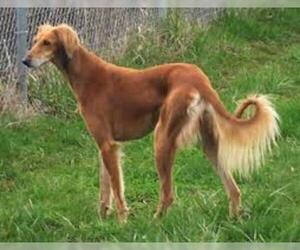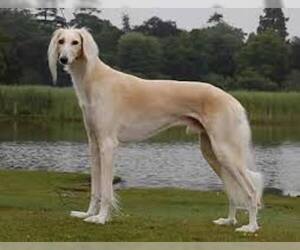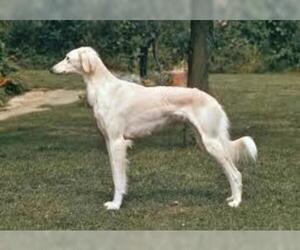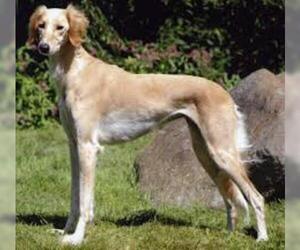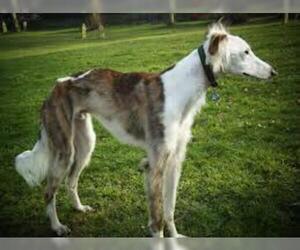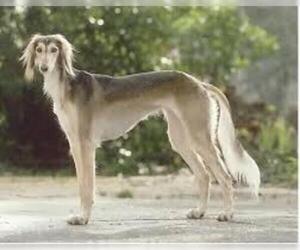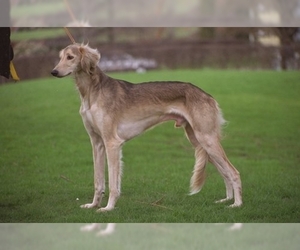
All about Saluki dog breed
A.K.A. :Persian Greyhound, Gazelle Hound, Royal Dog of Egypt, Arabian Hound, Desert Hound, Eastern Greyhound, Salu, Salki, Saluki Pup, Saluki Scout, Silk Hound, Noble Runner, Middle Eastern Sighthound, Regal Tracker, Sand Sprinter
Size
Grooming requirements
Exercise requirements
Good with other dogs
Watchdog ability
Energetic
Training requirements
Playful
Affectionate
Good with other pets
Good with children
Good with strangers
Winter
Summer
Healthiness
Protective
Life Span
| Pure Breeds | Member |
| Breeds A - Z | S |
| Breeds by Group | Hound Sighthound & Pariah |
| Breeds by Trait | Fast Dog Breeds High Stamina Dog Breeds |
| Overview: | The Saluki, an ancient and graceful breed, hails from the Middle East, where it was historically prized by royalty for its incredible speed and hunting prowess. Physically, they are unmistakable with their lean, elegant build, long feathered ears, and a distinctive plumed tail. Their coat can be either smooth or feathered, typically in a variety of colors including white, cream, fawn, and black. Temperamentally, Salukis are known for being independent, gentle, and somewhat reserved, often forming strong bonds with their immediate families but remaining aloof with strangers. While they are generally good with respectful children and can coexist with other pets if properly socialized, their high prey drive means small, fast-moving animals might be seen as quarry. Due to their need for regular exercise and a secure, spacious environment to run, they are best suited for active families with fenced yards, though they can adapt to apartment living with dedicated daily walks and opportunities to sprint in safe areas. Health-wise, Salukis are generally robust but can be prone to certain conditions such as cardiac issues and some forms of cancer, making regular veterinary check-ups important for their long-term well-being. |
F.A.Q.
All You Need to Know About the Saluki Breed
The Saluki, an ancient breed originating from the Middle East, is renowned for its grace and speed. These elegant sighthounds possess a dignified, yet gentle temperament, making them affectionate companions for the right families. Physically, Salukis are lean and athletic, with a distinctive feathered coat (or smooth variety) and a regal bearing. While they can adapt to apartment living if adequately exercised, a secure yard is ideal for their energetic bursts. They are generally good with older, considerate children but may view smaller pets as prey due to their strong chase instinct. Grooming needs are moderate; weekly brushing keeps their coat healthy. Daily exercise, including opportunities for running, is crucial to prevent boredom and destructive behaviors. Common health considerations include certain cancers, heart conditions, and bloat. A well-socialized Saluki is a loyal and devoted friend, offering years of quiet companionship and stunning beauty.Saluki Weight: Average Size & Healthy WeightThe average weight for a Saluki is around 50 pounds.A healthy weight for adult Saluki typically ranges from 40 to 65 pounds.* Males are generally larger, weighing between 45-65 pounds.* Females are usually lighter, ranging from 40-55 pounds.This information on Saluki weight provides a good guideline for understanding the typical size of this graceful breed.
Curious about the Saluki height? This elegant sighthound has a distinctively graceful build. The average size of an adult Saluki, measured at the shoulder, typically ranges from 23 to 28 inches. So, how tall is a Saluki? You can generally expect them to fall within that 23-28 inch range.
While this is the standard, it's worth noting that individual genetics and slight variations based on gender can occur. For instance, males may sometimes be at the higher end of the range, or even slightly exceed it, while females might be found closer to the lower end. However, all healthy Salukis should remain within a reasonable proximity of this established breed standard. This stately height contributes to their agile and athletic appearance!The Saluki colors accepted by major kennel clubs like the AKC are diverse and beautiful, including black and tan, black and silver, black and cream, fawn, cream, white, golden, grizzle and tan, and various shades of red. You'll also find tricolor Salukis and striking brindle Saluki coats.Beyond these AKC recognized Saluki colors, there are rare coat types and exotic Saluki variations that are not accepted for show, but are equally stunning. These include blue Salukis, lilac Salukis, and sometimes even chocolate Salukis. While extremely rare and often associated with mixed breeding or specific genetic lines, discussions around merle Saluki coats also exist, though these are not purebred Saluki colors. Potential adopters should be aware that these rare and exotic Saluki variations may come with different pricing and should be verified for their purebred status if that is a concern.
The Saluki personality is a unique blend of independent thought and deep affection. They are often described as regal and reserved, but incredibly devoted to their families.While generally friendly, Salukis aren't typically outwardly demonstrative with strangers; their loyalty is reserved for their chosen people. They possess a quiet dignity and can be somewhat aloof, observing rather than immediately engaging.Sociability with other dogs is generally good, especially if socialized from a young age. However, their strong prey drive means careful introductions and supervision are crucial with smaller pets like cats or rodents. They are sighthounds, and that instinct is deeply ingrained.Adaptability to apartment living is surprisingly good if their exercise needs are met. They are not high-energy indoors; in fact, they are often quite calm and enjoy lounging on soft surfaces. However, they absolutely require regular, safe opportunities to run at full speed in a securely fenced area. A Saluki without proper exercise can become restless or destructive.With children, Salukis are typically gentle and tolerant, but their reserved nature means they might prefer quieter interactions. They are not boisterous playmates and should be respected for their space. Supervision is always recommended with any dog and young children. They thrive in a calm, predictable environment.
Saluki Temperament & Personality TraitsThe Saluki possesses a unique and elegant temperament, making them a captivating companion dog. They are known for their quiet dignity and gentle nature. While often described as aloof with strangers, a Saluki is deeply loyal and affectionate with their family. They are not typically overtly boisterous but form strong, devoted bonds.Friendliness & Sociability: Salukis are generally reserved and independent. They may not greet every new person with enthusiasm but are rarely aggressive. With proper socialization, they can be polite and tolerant. Their sociability extends more to their human family than to general public interaction.Loyalty & Affection: Within their family, Salukis are incredibly loyal and sensitive. They thrive on companionship and enjoy being close to their people, often seeking out a soft spot to curl up near them. Their affection is expressed in gentle ways, and they are known for their "shadowing" behavior.Apartment Living: Salukis can adapt to apartment living if their exercise needs are met. They are relatively quiet indoors and enjoy lounging. However, daily opportunities for secure off-leash running are crucial for their physical and mental well-being. A spacious, securely fenced yard is ideal.Behavior with Children: While generally gentle, Salukis are not typically the rough-and-tumble playmates some families seek. They tolerate polite children but prefer a calm environment. Supervision is always recommended, especially with very young children, as their sensitive nature means they may retreat from boisterous play.Behavior with Other Pets: Salukis can live peacefully with other dogs, especially if raised together. However, due to their strong prey drive, living with smaller pets like cats, rabbits, or birds requires extreme caution and extensive, careful introduction, if at all possible. Their instinct to chase is deeply ingrained.Stubbornness & Sensitivity: Salukis can exhibit a degree of independence and stubbornness, which can make training challenging. They respond best to positive reinforcement and gentle, consistent methods. They are highly sensitive and do not tolerate harsh correction. A Saluki will shut down if treated unkindly. They are intelligent but have their own agenda.Overall, the Saluki temperament is one of gentle grace, quiet devotion, and a touch of independent spirit, offering a rewarding experience for those who appreciate their unique personality traits as a companion dog.
Saluki Care: Daily Maintenance & Health TipsGrooming: Salukis require minimal grooming. Their short, silky coat needs weekly brushing to remove loose hair and maintain shine. Salukis are known for being very clean and typically don't have a strong doggy odor. Baths are only necessary when they get particularly dirty. Regularly check and clean their long, floppy ears to prevent infections. Saluki care for nails involves monthly trimming to prevent discomfort.Exercise: Despite their slender build, Salukis are a relatively low-energy dog breed indoors. They thrive on short, intense bursts of exercise, such as a daily run or a session at a securely fenced dog park where they can gallop freely. Leashed walks are also beneficial. However, their high prey drive means they should always be leashed in unfenced areas to prevent them from chasing small animals.Dietary Considerations: Feed a high-quality, balanced diet appropriate for their age and activity level. Due to their lean build, weight management is crucial to prevent both obesity and malnourishment. Monitor their intake and consult your vet for specific portion recommendations.Health & Climate: Salukis are sensitive to cold weather due to their thin coat and lack of body fat; sweaters or coats are recommended in chilly climates. While generally healthy, common concerns include skin issues and dental disease. Regular veterinary check-ups are essential for preventative Saluki care. Pay close attention to their teeth and gums; daily brushing can significantly reduce the risk of dental problems.How to care for a Saluki involves providing a loving, understanding home that respects their independent yet affectionate nature. Early socialization and consistent, positive reinforcement training are key for this sensitive breed.
Saluki Activity Level: How active are Saluki? Salukis are known for their elegant, yet often surprising, activity level. They balance incredible bursts of energy with long periods of rest. While they love to run, they are not hyperactive and are more likely to be found lounging on the sofa than constantly seeking attention.
Their exercise needs involve a daily opportunity for a vigorous run in a secure, fenced area. Due to their strong prey drive and speed, off-leash exercise in unfenced areas is generally not recommended. A long, brisk walk or a good game of chase in the yard will also satisfy their daily requirements. They enjoy playtime, especially chasing lure toys, but are not typically fetch fanatics. Salukis are not brachycephalic; therefore, they do not have limitations related to breathing issues in hot weather, but like all dogs, should not be over-exercised in extreme heat. Salukis are suitable for active families who can provide them with their necessary daily exercise, but also for low-energy households that appreciate a calm, quiet companion indoors. They thrive when they have space to stretch their legs and then unwind. Understanding Saluki exercise needs is key to a happy home.Breed Breakdown: What Experts Say About the Saluki
I'd rate the Saluki's "Size" trait a 6 out of 10.While not a giant breed, the Saluki is far from small. Males typically stand between 23 and 28 inches at the shoulder and weigh 45-65 pounds, with females being slightly smaller. They possess a lean, athletic, and somewhat elongated build, which, despite their graceful appearance, takes up a surprising amount of space. They are significantly larger than most toy or small terrier breeds, and their long legs contribute to their overall impressive stature. Compared to other companion dogs, they fall squarely into the medium-large category. This makes them less ideal for very small apartment living unless they receive ample outdoor exercise, as their long stride and need for movement can make confined spaces feel even smaller. They can be good travel companions in a car if they have enough room to stretch, but their size might make air travel more challenging. Households with space constraints might find them a bit cumbersome, preferring a home with at least a medium-sized yard or regular access to open areas.
I would rate the Saluki's grooming requirements a 3 out of 10.The Saluki is a relatively low-maintenance breed when it comes to grooming, especially compared to many other companion dogs. Their short, smooth coat (though there is a feathered variety, even that is not extremely dense) sheds moderately, but it's easily managed with weekly brushing to remove loose hair and keep the coat healthy. They don't have extensive skin folds that require meticulous cleaning, and their ears, while needing routine checks for wax buildup and signs of infection, are generally not prone to excessive issues requiring specialized care. Nail trimming is a standard requirement for all dogs and not particularly difficult for Salukis. Bathing is only needed when they get truly dirty, as their coat repels much of the grime. They are not known for being overly susceptible to skin issues or allergies, which further simplifies their care. While the feathered variety will need a bit more attention to prevent tangles in the feathering on their ears, tail, and legs, it's still far from the intensive daily brushing or professional grooming required by breeds with long, dense, or double coats.
Rating: 8/10The Saluki, with its history as a sighthound bred for hunting in arid regions, possesses a remarkable athleticism and a high need for exercise. While they are known for their calm and somewhat independent demeanor indoors, this belies their deep-seated requirement for regular, intense physical activity. They aren't a breed content with a quick stroll around the block; their energy levels are considerable, and they thrive on sustained movement. Their slender, muscular build and deep chest are perfectly designed for speed and endurance, allowing them to run at impressive speeds for extended periods.Unlike brachycephalic breeds, Salukis have excellent respiratory capacity, making them well-suited for various types of strenuous exercise. They particularly excel at activities that allow them to stretch their legs and run, such as lure coursing, racing, or off-leash running in a securely fenced area. Daily long walks, vigorous playtime, and opportunities for free running are essential for their physical health and mental well-being. Without sufficient exercise, Salukis can become restless, bored, and may develop destructive behaviors. Structured routines that incorporate both bursts of speed and endurance activities are vital to keep them healthy, happy, and mentally stimulated, preventing them from becoming couch potatoes and allowing them to express their natural sighthound instincts.
The Saluki's "Watchdog Ability" rates a 3 out of 10.While Salukis are alert and aware of their surroundings, their primary instinct is not to protect or deter. They are generally quiet, graceful, and reserved, rather than prone to excessive barking at every unknown sound or person. Their territorial instincts are low, and they are more likely to observe an unfamiliar person with a calm curiosity than to bark aggressively or attempt to deter an intruder. They are far more of a passive companion, observing household activities and people with a gentle disposition. While they might offer a soft "woof" to alert their owner to a new arrival, it's more of a notification than a warning, and they lack the inherent drive and protective instinct to be considered an effective household watchdog.
I would rate the "Good with Other Dogs" trait of the Saluki breed as a 7.Salukis are generally known for being quite tolerant and often enjoy the company of other dogs, especially those they've grown up with or are familiar with. They are not typically prone to aggression or dominance; rather, their reserved nature often extends to their interactions with other canines. They tend to be more polite than boisterous in initial greetings, and while they might not engage in intense, rough-and-tumble play with every dog, they usually coexist peacefully.However, their sighthound instincts and sensitivity mean they benefit from careful introductions to unfamiliar dogs, particularly those with very different play styles or high energy levels. While they can adapt to multi-dog households, they thrive best in canine company when the other dogs are also calm and respectful, or when they've been socialized from a young age. Their quiet demeanor means they might be overwhelmed by overly boisterous or demanding playmates, and their strong prey drive, though typically not directed at other dogs, can sometimes be a factor in highly stimulating environments with very small, fast-moving dogs. Therefore, while generally sociable, they are not always the "life of the party" and appreciate a degree of calm and understanding from their canine companions.
I would rate the "Energetic" trait of the Saluki breed as a 4 out of 10.While the Saluki is a sighthound built for incredible bursts of speed, they are not a breed with a consistently high energy level throughout the day. They have a more "on/off" switch when it comes to activity. They are naturally active during their designated exercise periods, needing daily opportunities to gallop and stretch their legs, ideally in a secure, fenced area where they can truly run. Their endurance for long, sustained activities at a high pace is moderate; they prefer short, intense bursts followed by rest. Playfulness is present, but often with a reserved dignity, and they aren't typically the type to fetch endlessly for hours.The Saluki's need for physical stimulation is moderate; they require regular outlets for their sighthound instincts but are content to lounge for much of the day once those needs are met. They can certainly participate in outdoor activities, especially those involving running, but they are equally adept at being elegant couch potatoes. Compared to other companion dogs, they are more laid-back indoors than many breeds, often described as calm and quiet within the home, especially as adults.Regarding brachycephalic anatomy, it's important to note that the Saluki is not a brachycephalic breed. They possess a long, refined muzzle and excellent respiratory capacity, which is crucial for their running prowess. Therefore, their natural anatomy does not negatively affect their stamina or exercise tolerance; in fact, their athletic build is designed for it. Any limitations on their activity would be due to factors like age, health, or insufficient conditioning, not their skull structure.
I would rate the Saluki's "Training Requirements" at a 7 out of 10.Salukis are intelligent dogs, but their independent and sighthound nature often translates into a high degree of stubbornness and a shorter attention span, especially when there are more interesting things to chase or observe. They are not primarily people-pleasers in the way some retriever or herding breeds are, which can make them less immediately responsive to commands. Consistency is paramount with a Saluki, as they will quickly test boundaries if given the opportunity. Positive reinforcement is highly effective, but it needs to be delivered in a way that truly motivates them – often involving high-value treats or engaging play. They are definitely not beginner-friendly and require experienced handling. Their training demands a patient, creative, and firm individual who understands the sighthound mindset and can establish structured routines from a young age, focusing on clear communication and building a strong bond based on trust and respect, rather than expecting unquestioning obedience.
Rating: 5The Saluki, while undeniably graceful and capable of impressive bursts of speed, generally possesses a more moderate and selective level of playfulness compared to some other companion breeds. They aren't typically the boisterous, constantly "on" dogs who demand endless games of fetch. Their activity level in the home tends to be quite laid-back, often preferring to lounge in comfort. While they do enjoy a good chase or a brief, spirited play session, particularly with their human family, their love for games and interaction isn't usually characterized by extreme enthusiasm or constant attention-seeking. They might show interest in toys, especially those that encourage their natural prey drive like squeaky toys or those they can "kill," but sustained, high-energy play is less common. Their playfulness often manifests as more of a quiet joy in their interactions rather than an overt, demonstrative exuberance. They are certainly capable of being spirited, especially when young or outdoors, but indoors they are more akin to a comfortable, elegant companion than a playful whirlwind.
I would rate the "Affectionate" trait of the Saluki breed a 7 out of 10.While not overtly demonstrative like some retriever breeds, Salukis possess a deep and quiet affection for their families. They crave human companionship and form strong, loyal bonds. They are sensitive to their owner's emotions and will often provide a comforting presence, though it might be a gentle lean or a resting head rather than exuberant licks. Many Salukis do enjoy physical closeness and can be quite content curled up on the sofa next to their person, and some will even attempt to be lap dogs despite their size. They often follow family members from room to room, preferring to be in the same general vicinity. They thrive on affection and reassurance from their chosen people, but they also retain an elegant independence. They won't typically demand constant attention or be excessively "needy," but they genuinely appreciate and respond to love and connection. They are more reserved than some other companion dogs, yet deeply devoted.
Rating: 6/10The Saluki's "Good with Other Pets" trait sits around a 6 because while they can absolutely coexist peacefully with other animals, it's not always a guaranteed, effortlessly harmonious situation, particularly with smaller pets. Their inherent sight hound nature means they possess a very strong prey drive, which is a significant factor. This drive makes them generally incompatible with cats, small rodents, or birds unless they are raised with them from a very young age and constantly supervised, even then, incidents can occur. For this reason, many Saluki owners find it safer not to introduce them to non-canine pets.However, when it comes to other dogs, Salukis are typically much more sociable. They are generally tolerant and can enjoy the company of other canines, especially other sight hounds or dogs with a similar energy level. Resource guarding is not a prominent trait in the breed, and they are not typically aggressive. Their gentle and somewhat reserved nature means they're usually not instigators of conflict. Early and consistent socialization is key, as with any breed, to ensure they learn appropriate social cues. With other dogs, they can be quite adaptable in multi-dog households, often enjoying the companionship. Therefore, while training and constant supervision are absolutely necessary to manage their prey drive around smaller, non-canine pets, they are generally more naturally sociable and adaptable within a multi-dog household.
I'd rate the Saluki's "Good with Children" trait a 5 out of 10.While not inherently aggressive or ill-tempered, the Saluki is a breed that is often described as "sensitive" and "independent." They are generally gentle and affectionate with their own families, but their patience can be limited, especially with the unpredictable energy and boisterousness of young children. They might tolerate some handling and noise, but they aren't typically a breed that thrives on constant interaction or rough-and-tumble play. Their natural sighthound instincts also mean they may be easily startled by sudden movements or loud noises, and their prey drive can be a concern with very small, fast-moving children or other small pets if not properly trained and supervised. They are more likely to prefer a quiet, calm environment and may retreat rather than engage when overwhelmed. For older, more respectful children who understand how to interact gently with a dog, a Saluki can be a wonderful and loving companion, but they require significant training and supervision to ensure a harmonious household with younger kids, rather than being naturally child-friendly like some other breeds.
I'd rate the "Good with Strangers" trait of the Saluki breed a 6.Salukis are generally polite and well-mannered around unfamiliar adults, but they are not typically effusive or boisterous in their greetings. They tend to be more reserved and dignified, observing new people rather than rushing in for immediate affection. While not unfriendly, they can be aloof and may take some time to warm up to strangers. They are not prone to barking or guarding in a territorial sense; their independent nature means they're unlikely to perceive a new person as a threat, but also unlikely to consider them an instant friend. With proper socialization from a young age, they can be perfectly comfortable and adaptable in public or guest-filled environments, maintaining their composure. However, their natural inclination is more toward quiet acceptance than enthusiastic welcoming, and while training can certainly help them tolerate and even enjoy new encounters, it doesn't fundamentally change their naturally reserved disposition.
The Saluki breed's "Winter" tolerance rates at a 3.This rating reflects their extreme sensitivity to cold due to several key factors. Salukis possess a very thin coat, offering minimal insulation against frigid temperatures. Their lean body, with very little body fat, also means they have a reduced natural defense against heat loss. As a medium-to-large breed, their surface area to volume ratio, while not as extreme as a tiny dog, still means they dissipate heat more readily than a compact, heavily-coated breed. Crucially, they lack the brachycephalic anatomy that can sometimes lead to difficulty breathing in cold air, but this doesn't offer them any advantage in terms of heat retention.The risk of hypothermia is significant for Salukis in cold climates, and they are generally unable to safely enjoy extended outdoor activity during winter months without substantial protection. Compared to many other companion dogs, Salukis absolutely require special care during winter. They need warm clothing like coats and sweaters for even short outdoor excursions, and prolonged exposure to cold should be avoided entirely. Their indoor environment should be kept comfortably warm, and owners should be vigilant about any signs of shivering or discomfort.
The Saluki breed's "Summer" tolerance would be rated a 7 out of 10. While not possessing the extreme heat tolerance of some desert breeds, Salukis are generally well-suited to warm climates. Their lean build, short coat, and efficient panting system contribute to their ability to regulate body temperature effectively. Unlike brachycephalic breeds, their elongated muzzles allow for efficient airflow and cooling. They are active dogs but, like all breeds, are susceptible to heatstroke if over-exercised during the hottest parts of the day or left without access to shade and water. During summer, special care is recommended compared to some other companion dogs, primarily focusing on avoiding strenuous activity during peak heat, providing ample water and shaded rest areas, and never leaving them unattended in a car. While not requiring constant air conditioning like heavily coated or brachycephalic breeds, common-sense precautions are essential to ensure their comfort and safety.
I would rate the Saluki's "Healthiness" trait as an 8 out of 10.Salukis are generally considered a robust and healthy breed, particularly when compared to many other companion dogs. They are not prone to the multitude of serious genetic issues that plague some other breeds, and their athletic, lean build contributes to fewer common problems like severe joint issues often seen in heavier or dwarfed breeds. Their deep chests can make them susceptible to bloat, a serious and life-threatening condition, and some lines can be prone to certain cancers, heart conditions (like dilated cardiomyopathy), and eye problems (such as progressive retinal atrophy). However, these are not overwhelmingly prevalent across the entire breed. Responsible breeding practices, including health clearances for breeding dogs, significantly reduce the incidence of these concerns. Their life expectancy is quite good, often ranging from 12 to 14 years, which speaks to their overall hardiness. While they require regular exercise and a good diet, they are not high-maintenance in terms of constant vet visits or specialized care for chronic conditions. They are more generally robust, requiring standard preventive care and awareness of breed-specific predispositions rather than being inherently fragile.
I would rate the "Protective" trait of the Saluki breed a 2.Salukis are generally not considered a protective breed. While they are incredibly loyal and devoted to their owners, their primary instinct is not to guard or defend. They are highly alert and will often notice and react to anything new or unusual in their environment, but this is more due to their keen senses and curious nature than a desire to protect. Their territorial instincts are minimal; they are more likely to observe a stranger with a reserved aloofness than to confront them aggressively. They are notoriously quiet, making them poor watchdogs in terms of barking to alert. Furthermore, their gentle and sensitive nature means they are highly unlikely to engage in any form of physical defense, making them entirely unsuitable as guard dogs. Salukis are bred for speed and companionship, excelling as graceful, affectionate pets rather than protectors. They would likely perceive a threat as something to be observed or avoided, not confronted.
The Saluki breed's "Life Span" trait rates a 9 out of 10.Salukis are renowned for their exceptional longevity among companion dog breeds. Their average life expectancy typically ranges from 12 to 14 years, with many individuals living well into their mid-teens, and some even reaching 16-17 years with good care. This places them firmly in the long-lived category compared to most other dogs. They are generally a very healthy breed, with relatively few common hereditary health issues that significantly impact lifespan. While like any breed, they can experience age-related ailments such as certain cancers or heart conditions, there isn't a widespread genetic predisposition to debilitating diseases that shorten their lives in a significant number of individuals. Responsible breeding practices further contribute to their health and longevity by screening for potential issues and maintaining a robust genetic pool. Their generally lean build and active lifestyle, when appropriately managed, also contribute to their overall well-being and extended years.
Saluki Dogs for adoptionSee all dogs for adoption
Similar Dog Breeds for Saluki
Breed Mixes of Saluki
Quick Breed Selector 0 - not important, 1 - smallest, 10 - largest
Variants & Mistakes :Saluky, Seluki, Seluky, Suluki, Salouki, Salouky, Sahluki, Sahluky, Saluke, Seluke, Suluke, Salokee, Saloocki, Salouckey, Salookie, Salukie, Salucki, Saluckey, Salukey, Sulouki, Sulouky, Salukei, Salukiw, Salukij, Salukil, Salukio, Salukiu, Salukki, Salluki, Salluky, Sauluqi, Saluqi, Saluqui, Saliqui, Salika, Saluka, Salluqi, Saloqui, Saluuka, Saluuqi, Salouqi, Seluqi, Suloqi
